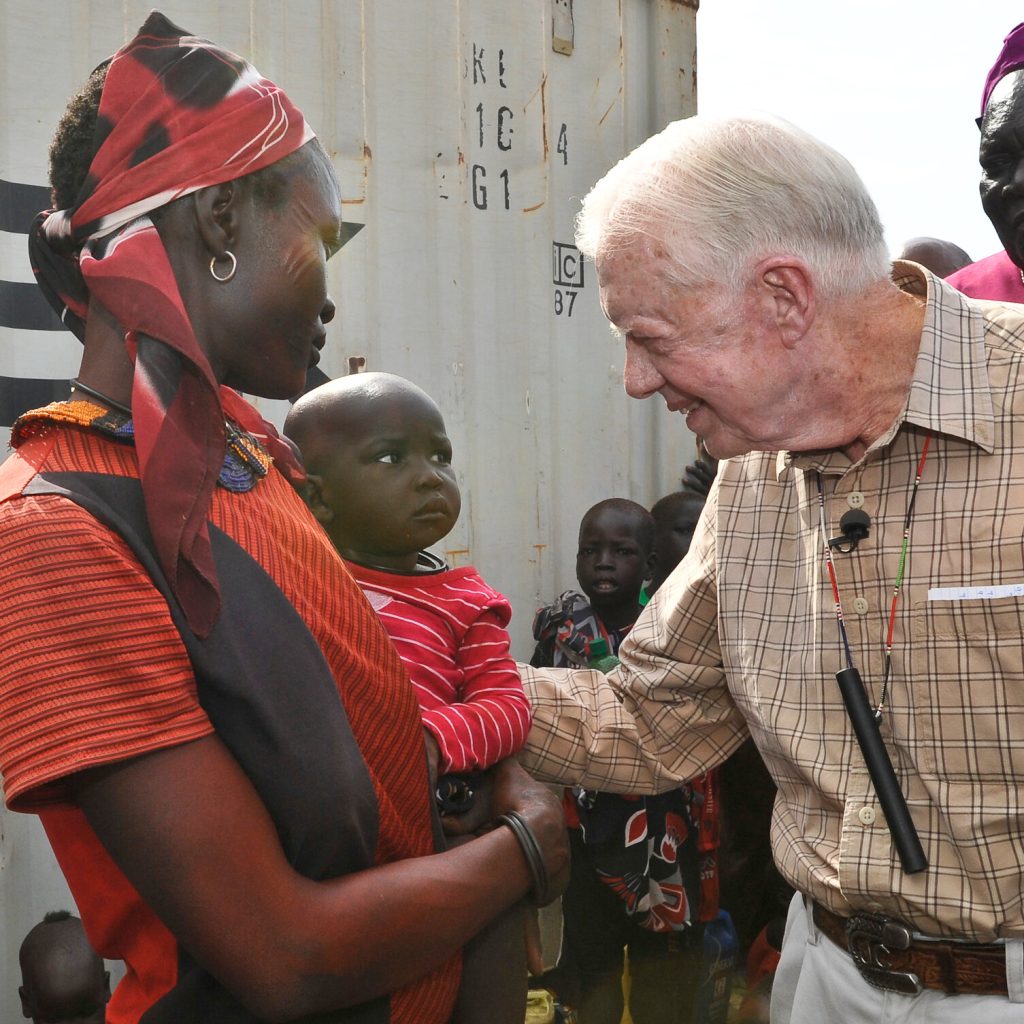The world mourns the passing of Jimmy Carter, the 39th President of the United States, who died at the age of 100 in his hometown of Plains, Georgia, on December 29. As the longest-living U.S. president in history, Carter leaves behind a monumental legacy of compassion, public service, and tireless advocacy for global health. From his tenure in the White House to his post-presidency humanitarian work, Carter’s impact has been felt worldwide.

Early Life and Presidential Legacy
The Rise of a Leader
Born on October 1, 1924, in Plains, Georgia, Jimmy Carter grew up during the Great Depression, which instilled in him a strong sense of community and service. Before assuming the presidency in 1977, Carter served as a Georgia state senator and governor. His tenure as the 39th president (1977-1981) was marked by significant achievements, including the Camp David Accords and the establishment of the Department of Energy.
A Transformative Presidency
While Carter’s presidency faced economic challenges, his focus on human rights and diplomatic solutions set him apart. After leaving office, Carter dedicated himself to humanitarian causes, carving out a new role for former presidents by using his influence to address pressing global issues.
A Tireless Advocate for Public Health
The Carter Center: A Beacon of Hope
Founded in 1982 by Jimmy and Rosalynn Carter, the Carter Center became a driving force in combating global health issues and promoting peace. The center has focused on eradicating neglected tropical diseases (NTDs) and advancing human rights.
Championing Neglected Tropical Diseases
Neglected tropical diseases disproportionately affect impoverished regions, often going unnoticed by the global community. Under Carter’s leadership, the Carter Center prioritized the elimination of six key diseases:
- Guinea Worm Disease
- River Blindness (Onchocerciasis)
- Trachoma
- Lymphatic Filariasis (Elephantiasis)
- Schistosomiasis
- Malaria
Key Health Achievements
Eradicating Guinea Worm Disease
One of Carter’s most notable successes was his campaign to eradicate Guinea worm disease. Once prevalent in millions, cases have been reduced to fewer than a hundred annually, thanks to the Carter Center’s efforts to promote clean water access and public health education.
Addressing River Blindness
River blindness, caused by a parasitic worm transmitted through blackfly bites, was another focus of Carter’s work. His efforts brought treatments to remote regions, drastically reducing the prevalence of the disease.
Challenges in Fighting Neglected Tropical Diseases
Barriers to Treatment
Neglected tropical diseases often thrive in remote, impoverished areas, making treatment and prevention challenging. They are typically chronic but non-lethal, which means they receive less attention and funding compared to diseases like HIV/AIDS or tuberculosis.
Advocating for Marginalized Populations
Carter’s ability to shed light on these diseases helped mobilize resources and inspire global cooperation. His work emphasized that combating these diseases was not just a medical issue but also a moral imperative.
Remembering Jimmy Carter’s Humanitarian Legacy
A Life of Service
Carter’s post-presidency years exemplify his commitment to public service. From building homes with Habitat for Humanity to monitoring elections worldwide, his work set a standard for civic engagement.
Tributes from World Leaders
President Joe Biden paid homage to Carter’s legacy, describing him as “a man of great character and courage, hope, and optimism.” Biden highlighted Carter’s compassion and his tireless efforts to improve the lives of those less fortunate.
Personal Resilience and Family Legacy
Overcoming Health Challenges
Despite numerous health setbacks in recent years, including metastatic melanoma and a fractured pelvis, Carter’s resilience was remarkable. Even after entering hospice care in February 2023, he remained an enduring symbol of strength.
A Historic Marriage
Carter’s wife of 77 years, Rosalynn Carter, passed away in November 2023. Together, they were the longest-married presidential couple in U.S. history, united by their shared dedication to humanitarian causes.
Frequently Asked Questions (FAQs)
1. What were Jimmy Carter’s most significant achievements as president?
Carter is best known for the Camp David Accords, advancing human rights, and creating the Department of Energy.
2. How did the Carter Center contribute to global health?
The Carter Center has been instrumental in combating neglected tropical diseases, promoting democracy, and advancing human rights.
3. What is Guinea worm disease, and how did Carter help fight it?
Guinea worm disease is caused by contaminated water. The Carter Center’s efforts have reduced cases to near eradication by improving water access and education.
4. What are neglected tropical diseases?
Neglected tropical diseases are a group of infectious conditions that primarily affect impoverished regions. They include diseases like river blindness, trachoma, and schistosomiasis.
5. How is Jimmy Carter remembered today?
Carter is celebrated as a humanitarian and advocate for global health, peace, and human rights, with a legacy that transcends his presidency.




